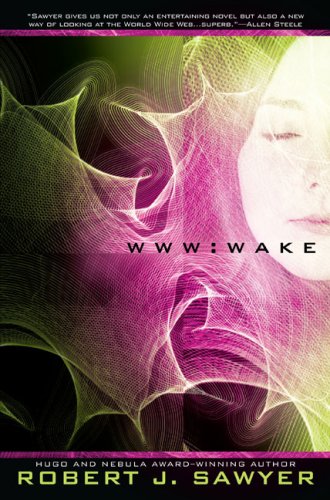Magical Visions
 I've just finished my fourth book of the six novels nominated for the 2010 Hugo. www.Wake was a fun story, featuring young Caitlin, a blind American girl living in Canada who has the incredible opportunity to acquire the ability to see with the help of an invention by a Japanese scientist. The experiment at first seems to go awry, but other things are afoot, as the reader is privy to information that is at first hidden from Caitlin.
I've just finished my fourth book of the six novels nominated for the 2010 Hugo. www.Wake was a fun story, featuring young Caitlin, a blind American girl living in Canada who has the incredible opportunity to acquire the ability to see with the help of an invention by a Japanese scientist. The experiment at first seems to go awry, but other things are afoot, as the reader is privy to information that is at first hidden from Caitlin. The story is stylistically YA, with some material that would kick it off your high school library shelves. At times the exposition becomes awkward, a bit like your grandpa explaining twitter to you when he thinks it's a kind of telegraph. None of these are deal breakers, but it had a serious flaw that bothered me. Let me explain.
I'm currently reading a short paper about a new (or maybe not so very new) theory of gravity. It's got a lot of concepts that I'm very foggy on, like entropy and gradients and screens (a kind of surface) and the whole thing is in a PDF that I'm reading on my Nook ebook reader which does a horrible job rendering the paper. I think I kind of understand what the authors are getting at, and it sounds like a good idea, but I'm in no position to judge if the idea is valid (if it matches empirical data) or if it is useful (if it makes new testable predictions or solves current quandaries, like the quantum gravity problem, dark matter, or dark energy).
I'm a computer programmer. My last serious exposure to physics and math was thirty years ago, when I earned my degree. I remember all the significant bits, but I've managed to forget a lot of details that at the time I had been very proud to have mastered. It's a bit embarrassing, to tell the truth, but in this as in most other things, if you don't use it, you'll lose it.
But as a computer programmer, and one who has worked in data transmission protocols for about 20 years, there are some things I do understand. I think I understand them quite well, in fact. So when I come across a book that describes real stuff like the World Wide Web in magical terms, it bothers me. I supposed it might bother me to read a story that allows faster than light travel without some appropriate mumbo jumbo, but Sawyer doesn't use any fun mumbo jumbo.
It's glaring enough that it made "suspension of disbelief" seem like a marathon.
I think for people who are not computer programmers, the book will be very enjoyable. People who are computer programmers, but who don't give data transmission technology a lot of thought should also like the story. But if you understand the stuff that goes on in the wires of the internet, you may find Sawyer's story setting your teeth on edge.

0 Comments:
Post a Comment
<< Home